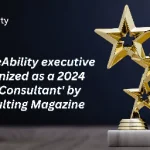Empowering Your Workforce: How DEI Training Can Build a Culture of Inclusion
Today’s business landscape continues to become more nuanced and increasingly competitive as organizations seek to attract and retain top talent. Prioritizing diversity, equity and inclusion (DEI) is important for securing the most skilled talent at any level. In fact, in a 2021 survey conducted by Glassdoor, 76% of employees reported that a diverse workforce is a key consideration when reviewing a potential employer. As most business leaders know, a critical driver in creating an equitable work culture is ongoing employee training and offering programs and benefits which align with DEI values. But how can it be done effectively and economically, allowing organizations to stand out among a sea of choices for the most sought-after talent?
This article provides insights and strategies to successfully implement ongoing and impactful DEI training, create a competitive and holistic benefits package, and establish cultural programs and employee resources groups (ERGs) that address the needs of today’s workforce and can be provided with minimal investment by the organization.
Go Beyond the Basics: How to Elevate DEI Training
Providing meaningful training to employees plays a pivotal role in fostering a culture of DEI within an organization and serves as a foundational pillar for creating an environment where individuals from various backgrounds feel valued, respected and empowered to contribute their unique perspectives. In addition to online courses and eLearning modules, which provide self-directed options to training but may be less effective and engaging than blended program offerings, consider creating a training program that includes approaches which cater to unique learning preferences. Examples include:
- In-person workshops and seminars: Hosting in-person workshops and seminars led by DEI experts or trained facilitators can offer employees an interactive and immersive learning experience. The sessions often include discussions, break-out activities, and real-life scenarios to promote engagement and understanding.
- Virtual training programs: With the increasing popularity of remote work and geographically dispersed teams, virtual training programs have become an effective way to deliver DEI training. Virtual sessions should include videoconferencing, interactive exercises, and breakout discussions to facilitate engagement and collaboration, similar to in-person workshops.
- Managerial training and coaching: Providing DEI training specifically tailored for managers and people leaders is crucial for driving organizational change. These programs can help these professionals develop inclusive leadership skills, navigate diversity-related challenges, and create a supportive and equitable work environment for their teams.
- Intersectional DEI training: Intersectional DEI training is an approach that recognizes and addresses the connectedness of multiple identities (e.g., race, gender identity, sexuality, ability, socioeconomic status, etc.) within a person or group and how those overlapping identities impact a person. This concept, created by theorist Kimberlé Crenshaw, improves retention, recruitment, and employee advancement. Providing education on intersectionality can address the challenges faced by people with intersecting identities within an organization—beyond typical, monolithic approaches to DEI training. For instance, non-intersectional training aimed at women that encourages self-promotion in the pursuit of career advancement neglects to account for the reality that women of color often face repercussions when they are self-promotional at work. To truly foster equity, DEI training must not be generic; instead, it should precisely address the varying experiences of different groups.
Inclusive Benefits Packages
Training professionals should reiterate to business leaders and stakeholders that offering benefits that support a culture of DEI is essential for creating an environment where all employees are empowered to thrive and grow. Regularly reviewing and expanding benefits packages to ensure they meet the diverse needs of employees are essential for promoting equity. This may include comprehensive health care coverage, mental health resources, child care support, and family-friendly policies that cater to different life stages and situations.
Offering flexible work arrangements, such as remote work options, flexible hours and parental leave policies, supports employees in achieving work-life balance and accommodating diverse needs and responsibilities. Flexible policies that consider individual circumstances contribute to a more inclusive workplace culture. For example, parental support has proved to affect employee retention, with evidence that it has an even greater impact on women. A study conducted by the Institute for Women’s Policy Research found that 30% of women who do not have access to paid parental leave will drop out of the workforce within a year of becoming a parent. Of the 30%, one in five will not return to the workforce for over 10 years.
Many women who stay in their jobs will be passed up for promotions or choose not to pursue a promotion because she feels unsupported.
Creating a Community of Colleagues: Mentorship and ERGs
In addition to traditional training, offering mentorship programs and ERGs can be impactful and low-cost solutions for building an inclusive and supportive workplace culture. ERGs are employee-led groups created to foster DEI in the workplace; participation is voluntary, and the groups are typically centered around a common identity or goal.
Types of programs to consider:
- Create a Lean In circle: Offer employees small groups for peer mentorship, support and skills development.
- Educational speaker opportunities: Empower employees to present to the ERG members on their chosen topic. This is an economical but effective way to connect employees with innovative ideas and knowledge and increase connectedness between employees.
- One-on-one mentoring pairs: Pair the members of an ERG into thoughtful partnerships. Mentorship can improve the skills, connectedness, and sense of belonging for both mentors and mentees. This will ultimately expand their worldview and increase satisfaction in the workplace.
- Peer mentorships: Peer mentorship is another option to provide a collaborative learning relationship between individuals at similar levels within an organization or field. Unlike traditional mentorship, which typically involves a more experienced individual guiding a less experienced counterpart, peer-to-peer mentorship involves mutual support, learning and skill sharing among peers.
- Educational and inspiring content: Create or share educational or inspirational content within the company to increase employee knowledge, awareness, and engagement regularly.
- Culture-sharing spotlight: ERG members can take turns highlighting a part of their culture to help foster education, respect and connectedness with their colleagues. For example, an employee can teach their peers how to prepare a dish from their culture or can inform them about the meaning of a holiday or tradition.
Give a Voice to Your Values: Be Vocal and Transparent About DEI Efforts
Employees are aligning their personal and professional values, often seeking out companies that reflect their beliefs. report that they would resign from a new job if the organization’s culture did not align with their values. When employees feel that their identity and interests are represented and important to their employer, they feel a deeper connection to the company and their work.
Beyond this, employees will respect transparency from leadership about the company’s efforts to create a more equitable and inclusive workplace. Companies often have “all hands” meetings or quarterly reviews to discuss sales goals, market share, etc. Why not include updates about internal goals to hire and promote more women and people of color (POC)? Training and business leaders alike should speak openly with employees about goals, share relevant metrics, and regularly reinforce the company’s commitment to DEI. They should also be transparent about shortfalls in DEI efforts and the tangible plan to close the gap on those goals.
Looking Ahead: The Importance of Commitment and Accountability to the Ideals of DEI
Regardless of size or available funds, every company can benefit from a continued focus on supporting DEI. Clear communication about DEI goals, offering education about issues limiting women’s and POC’s growth in the workplace, and creating ERGs fosters education, relationship building, and peer support. This will help with the creation of a more equitable workplace that takes tangible steps toward elevating employees’ cultural awareness and connectedness.
These efforts require a steadfast commitment to DEI and training while holding each person within the organization accountable for fostering an inclusive, supportive and accepting corporate culture where all can bring their authentic selves to the workplace and have their unique contributions valued.
Read our insights featured in Training Industry.
About Kristen Rellihan
Kristen Rellihan is a Senior Director at Arroyo Strategy. With more than 15 years of experience collaborating with her clients and project teams, Kristen brings a breadth of experience and know-how to clients and procurement organizations. In addition to her procurement expertise, Kristen is the Executive Sponsor of the Arroyo Strategy Women’s ERG and Culture Team, advancing Arroyo Strategy’s DEI & culture initiatives. She was recognized by Consulting Magazine’s Women Leaders in Consulting Awards in the category of Excellence in Leadership.
About Arroyo Strategy
Arroyo Strategy, a Jabil company, is the leading provider of procurement services, offering advisory, managed services, digital, staffing, and recruiting solutions. For more than 25 years, we have focused exclusively on helping clients elevate their procurement function.
We combine leading methodologies, analytics, market intelligence, and industry benchmarks with our uniquely flexible and customizable service delivery model. Global organizations of all sizes trust Arroyo Strategy to transform their procurement operations, drive growth, and reimagine what’s possible.
Let Arroyo Strategy help you reimagine your procurement capabilities.
Media contact:
Kathleen M. Pomento
Chief Marketing Officer | Arroyo Strategy
kpomento@arroyostrategy.com




